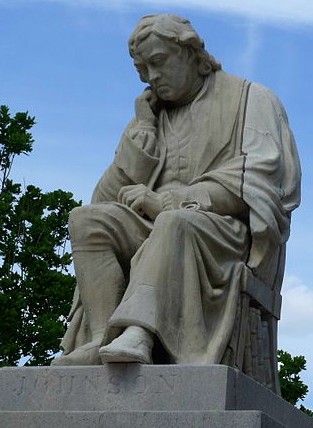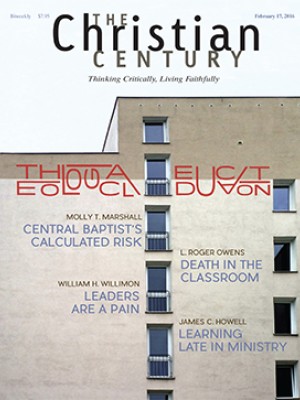Doctor Johnson’s failures

’Tis the season—for waking on a February morning to the consciousness of having failed to keep the resolutions made on New Year’s Day. I am meditating on this subject over a teacup full of Häagen-Dazs chocolate chocolate chip ice cream, at an hour long past the early bedtime I had promised myself, in the glare of a laptop screen I had resolved to shut down with the setting sun.
My comfort, along with the ice cream, is sitting next to me on the couch: volume 1 of the Yale Edition of the Works of Samuel Johnson, containing the prayers and diaries of this remarkable poet, journalist, critic, lexicographer, conversationalist, moralist, and satirist of human vanities: “Dr. Johnson,” “Dictionary Johnson.”
Read our latest issue or browse back issues.
So great was Johnson’s impact on his culture that historians have embedded in the Age of Enlightenment, which crossed the continents during the long 18th century, an “Age of Johnson,” no less universal for being peculiarly English. Johnson was a man of faith and reason during the epoch in which it first became an article of secular dogma that these twin acts of the human spirit are separated by what Gotthold Lessing would call an “ugly great ditch.” Religion was “the predominant object” of Johnson’s thoughts, according to his biographer James Boswell, and to Johnson what religion entailed was a cycle of solemn resolutions, lapses, and prayers for grace to renew the attempt. On his 28th birthday he writes, “I intend to-morrow to review the rules I have at any time laid down, in order to practice them,” praying for divine help to redeem the time “which I have spent in Sloth, Vanity, and wickedness.” Every New Year’s, every birthday, he rehearses his resolutions. On the anniversaries of his wife Tetty’s death, he recalls the promises he made before her coffin: “To rise early / To lose no time / To keep a journal.” He prays both for and to Tetty “conditionally”—uncertain whether it were lawful for an Anglican, yet unwilling to discount the wonderful possibility of mutual aid between the living and the dead.
Every New Year’s, every Easter, every birthday, every anniversary of his wife’s death, he takes stock and prays for the grace to try again. “Having lived hitherto in perpetual neglect of publick worship,” Johnson writes, he resolves that from now on he will rise early on Sundays, make his devotions, examine his past conduct, read the Bible, attend church twice, and seek “to wear off by meditation any worldly soil contracted in the week.” This will be the rule “which when my mind is capable of settled practice I hope to follow.” But when will his mind be capable of settled practice? Johnson writes down his rule to impress its force on his wandering mind, but equally so that his lapses may be obvious and his repentance bittersweet.
Five years later, Johnson is determined, with God’s help, “To apply to Study. To reclaim imagination. To consult the resolves on Tetty’s coffin. To rise early. To study Religion. To go to Church. To drink less strong liquours. To keep a Journal. To oppose laziness, by doing what is to be done”—and last but not least to “scheme life.” Walker Percy thought he was writing the last self-help book in Lost in the Cosmos, but Johnson got there first. No writer has more convincingly described the failure to “scheme life,” the near futility of hygienic self-improvement. Not piety alone, but piety weathered by illness, disfigurement, financial worries, marital difficulties, overwork, and hereditary melancholy (to the point that he feared madness), as well as his bungled attempts at self-discipline, made Johnson skeptical of the Enlightenment ideal of autonomy. He was a kind and courageous man (notwithstanding his well-known combativeness in debate), full of charity, whose setbacks inoculated him against spiritual pride.
The philosopher Ludwig Wittgenstein loved to read Johnson’s prayers as much as he disliked to read anyone else’s. There was something so human about Johnson, Wittgenstein said; and this was no faint praise, since for Wittgenstein, philosophy’s supreme task was to understand one’s own humanity and recognize the humanity of others.
Of course, there were small victories to record. On the second anniversary of Tetty’s death he writes, “Of the resolutions made this day, I, in some measure kept that of breaking from indolence.” More significant, though, is the thread of hope that runs through the whole sorry comedy of resolutions miscarried. Thus on Good Friday, 1775:
When I look back upon resoluti[ons] of improvement and amendments, which have year after year been made and broken, either by negligence, forgetfulness, vicious idleness, casual interruption, or morbid infirmity, when I find that so much of my life has stolen unprofitably away, and that I can descry by retrospection scarcely a few single days properly and vigorously employed, why do I yet try to resolve again? I try because Reformation is necessary and despair is criminal. I try in humble hope of the help of God.
Johnson concludes with a fresh resolve “to rise early, not later than eight.” Most likely he will fail. And so the comedy resumes: the will falters, habit encases us, perfect freedom eludes us. Yet after all our failed resolutions, hope has the final word.





